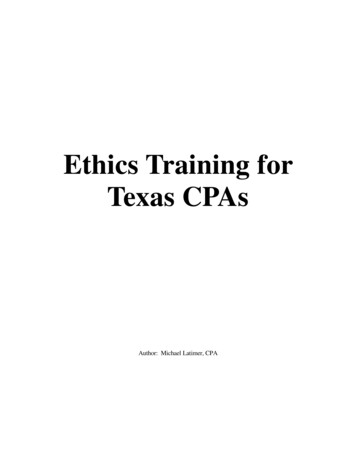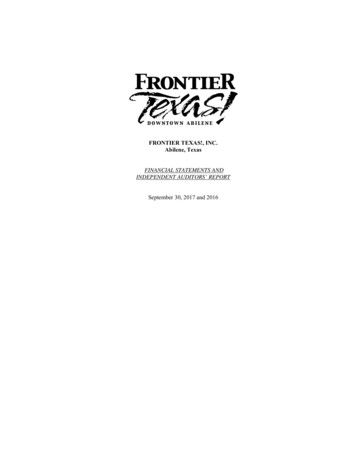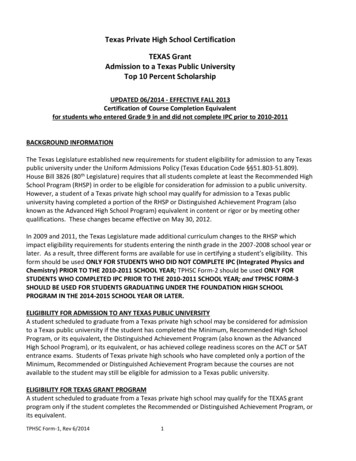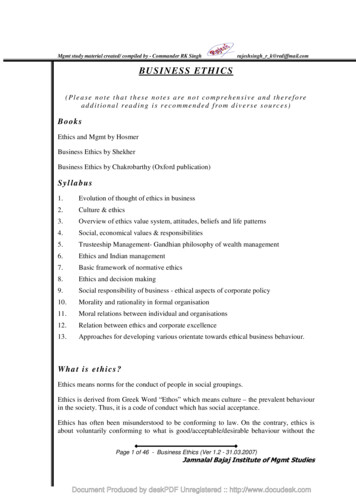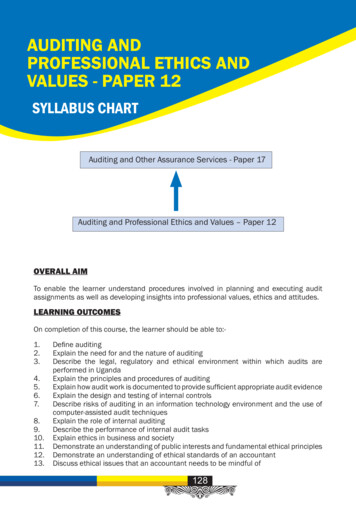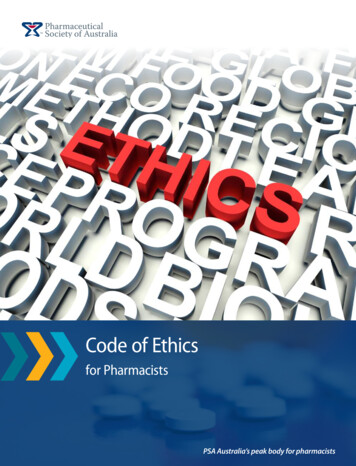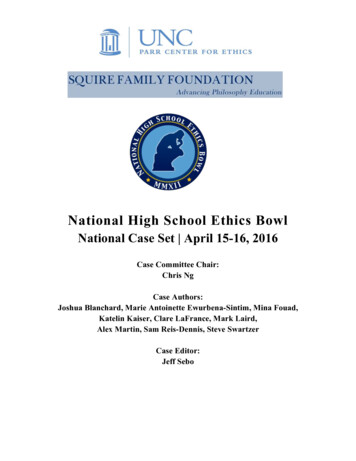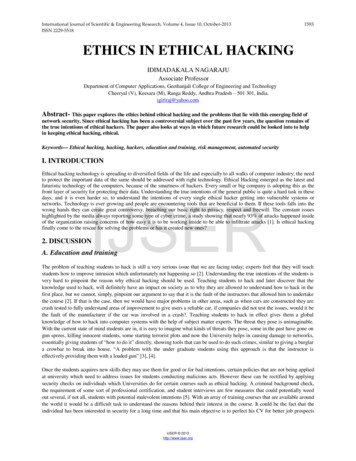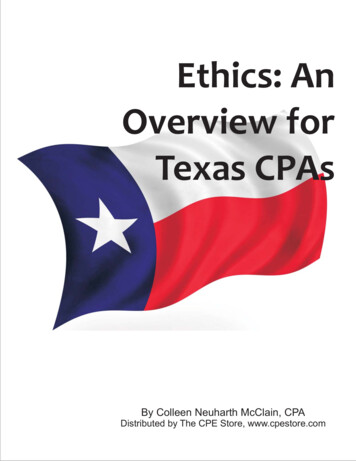
Transcription
Ethics: AnOverview forTexas CPAsBy Colleen Neuharth McClain, CPADistributed by The CPE Store, www.cpestore.com
Ethics: An Overview for Texas CPAsBy Colleen Neuharth McClain, CPACopyright 2010All rights reserved. No part of this course may be reproducedin any form without written permission from the author.1
2
Ethics: An Overview for Texas CPAsLearning Objectives . 5Introduction. 6Defining Ethics . 7Ethical Principles and Values . 7The Purpose of Ethical Education for CPAs. 9Ethical Reasoning and Dilemmas . 11The Reasoning Process . 11Greed. 13Success. 20Core Values of the CPA Profession. 22Integrity and Objectivity . 22Independence . 25Texas Rules of Professional Conduct . 30History of the Texas Rules of Professional Conduct . 30Applying the Rules of Professional Conduct. 31Professional Standards . 323
4
Ethics: An Overview for Texas CPAsLearning ObjectivesAfter completing this course, you should be able to Understand the purpose of studying ethics and be excited about the opportunity toimprove your ethical reasoning abilities. Understand the process of ethical reasoning and how to apply it when specificdilemmas occur. Comprehend the core values of the CPA profession (integrity, objectivity andindependence). Be familiar with the Texas Rules of Professional Conduct and enforcementactions that the Board has recently made to apply those rules. Understand the case studies which are presented throughout the course to assistyou in maintaining the highest standards of ethical conduct.5
IntroductionSubsequent to the collapse of Enron and the controversies surrounding Arthur Andersen, the Texas StateBoard of Public Accountancy (TSBPA) decided that two hours of board-approved ethics continuingprofessional education (CPE) each three years was not enough. Beginning January 1, 2005, every licenseemust take a four-hour ethics course on the Board’s Rules of Professional Conduct every two years. Thiscourse is designed to meet that requirement.In this course, we will define ethics and provide you with reasons you should be encouraged to continueeducating yourself with the goal of achieving the highest standards of ethical conduct as a CPA.The course will then discuss ethical reasoning and its application to common dilemmas that you mayexperience.Next, we will review the core values of the CPA profession (integrity, objectivity and independence).The final chapter of this course will discuss the Texas Board’s Rules of Professional Conduct as theyapply to all aspects of professional accounting work whether performed by CPAs in client practice, inindustry, in education or in government. This chapter will also illustrate enforcement procedures whichthe TSBPA has taken to apply the Rules.Throughout this course, you will be provided with case studies that demonstrate the application of ethicalprinciples, values, ethical reasoning and the Rules of Professional Conduct.6
Ethical Principles and ValuesWhile many of the prior Texas ethics courses you may have taken merely required you to memorize theTexas Rules of Professional Conduct for CPAs, this course will attempt to encourage you to becomeeducated in ethical principles and values as well as ethical reasoning as it applies to common situationsthat you may experience in your profession.To begin, it may interest you to understand more about the definition of ethics, ethical principles andvalues and the history of the Texas Rules of Professional Conduct.Defining EthicsEthics (also known as moral philosophy) can be defined as “a branch of philosophy that addressesquestions about morality — that is, concepts such as good and evil, right and wrong, virtue and vice,justice, etc.”Of the various sub-branches of ethical study, the following are the major sub-branches: “Meta-ethics, about the theoretical meaning and reference of moral propositions and how theirtruth-values (if any) may be determined; Normative ethics, about the practical means of determining a moral course of action; Applied ethics, about how moral outcomes can be achieved in specific situations; Moral psychology, about how moral capacity or moral agency develops and what its nature is;and Descriptive ethics, about what moral values people actually abide by.”Ethics on the other hand, can also be defined as “the science of human duty; the body of rules of dutydrawn from this science; a particular system of principles and rules concerning duty, whether true orfalse; rules of practice in respect to a single class of human actions; as, political or social ethics; medicalethics.”While the first definition offers a look at ethics as a philosophy, the above definition refers to ethics moreas a set of rules and principles.The term ethics can be defined in many ways. In the context of this course, we will use the term “ethics”to mean a set of rules based on an individual’s or specific group’s principles and values.Ethical Principles and ValuesOur ethical principles and values are the guides to our ethical decision making, as they provide thedirection in which to reason the decision we will make regarding a particular dilemma. For example, if aperson truly values people and believes in the principle that all people should be treated equally, they7
would most likely not be compelled to make any decisions based on racism.The following are some examples of ethical principles: Autonomy – Each person should be allowed to make their own decisions based on their lives. Beneficence – The duty to do good both individually and for all. This principle is mainlyassociated with the utilitarian ethical theory which we will discuss later in this course. Confidentiality – The duty to respect privacy of information and action. Finality – The duty to take action that may override the demands of law, religion, and socialcustoms. Justice – All people should be treated fairly. Least harm – A person should base their decisions on doing the least amount of harm to thefewest number of people. No Harm – Unlike the principle of least harm, this principle requires the duty to cause no harm,both individually and for all. Publicity – The duty to take actions based on ethical standards that must be known andrecognized by all who are involved. Respect for persons – A person should honor others, their rights, and their responsibilities as wehonor ourselves. In addition, people should not be used as a means to our end. Understanding/Tolerance – A person should appreciate and accept other people’s viewpoints, ifreason dictates doing so is warranted. Veracity – A person should always be honest and tell the truth.While all individuals are encouraged to create their own principles and value system, it should also berecognized that when joining a specific group or profession, you are generally required to also accept theprinciples and values that as a whole they have agreed upon. For example, when becoming a CPA in thestate of Texas each applicant is required to take an oath of office to support the laws and Constitution ofthe United States and of Texas and the rules adopted by the Texas State Board of Public Accountancy.There are basically two philosophies used to resolve ethical dilemmas, related to CPAs, which areutilitarianism and rule deontology.Utilitarianism (teleological ethics)The promotion that the bestinterest of everyone concernedthe moral standard: one shouldactions that lead to the greatestgood versus bad consequences8long-termshould betake thosebalance of
Deontology (Kantian ethics)It deals with the concept of duty and therightness of acts. It emphasizes maxims,duties, rules, and principles that are soimportant that they should be followedwhatever the consequences.The Purpose of Ethical Education for CPAsThe first professional accountants were known to have originated in England during the late 1800’s.However the title of Certified Public Accountant (CPA) was first created when the state of New York, inthe year 1896, through the work of its states legislature, passed a law designating the professional status.By doing so, New York also set the path for the process of regulating the accounting profession at thestate level rather than the federal level 1.Today, all jurisdictions in America have passed accountancy profession laws as well as laws governing allother professional titles within their states. In addition, all American state legislatures still regulate themajority of the administration of the CPA examination, licensing, maintenance and regulation ofmembership into the accountancy profession. Their regulation includes the specific requirements forcontinued professional education (CPE) for all CPAs within their jurisdiction.Accounting ethics are believed by many to have first been introduced by Luca Pacioli (the “Father ofAccounting”) and later expanded by government groups, professional organizations, and independentcompanies. Michael J. Fischer, in his paper “Luca Pacioli on Business Profits,” concludes that “it appearsalmost certain that he [Pacioli] would not tell us that there was anything fundamentally wrong orundesirable about engaging in business activities nor the pursuit of profits. In fact, Pacioli indicated hisbelief that the profit motive is a critical element of the successful business. However, it appears just asclear that Pacioli would strongly advise us to conduct our business both honestly and, perhaps moreimportantly, with a constant eye toward appropriate conduct of business people – individuals. Further,Pacioli clearly did not suggest that businesspersons should somehow separate their business from theirpersonal lives. Quite the contrary, he indicated that successful businesspersons should see the secular andspiritual aspects of their lives as inextricably intertwined, and further that in the conduct of their businessaffairs they should “above all keep God before [their] eyes” (Geijsbeek, 1914, pp. 37–38; Brown andJohnston, 1963, p. 34; Cripps, 1995, p. 9)”While the majority of the CPE which Texas CPAs are required to report each year is technical in nature,the TSBPA does now require that all Texas CPAs also receive training in ethics. Though producingaccurate and timely financial statements is the primary purpose of accounting, many people considerethics for CPAs to be just as important.Nine Good Reasons to be Ethical (from ETHIX)21. Litigation/Indictment Avoidance2. Regulatory Freedom3. Public Acceptance4. Investor Confidence12“A Reasoned Approach to Reform – White Paper,” AICPA, Section II.1, January 2003ETHIX, Bulletin (1), l9
5. Supplier/Partner Trust6. Customer Loyalty7. Employee Performance8. Personal Pride9. It's RightSubsequent to the collapse of Enron and Andersen LLP, the Texas State Board of Public Accountancy(TSBPA) decided that two hours of board-approved ethics continuing professional education (CPE) eachthree years was not enough. Beginning January 1, 2005, every licensee must take a four-hour ethicscourse on the Board’s Rules of Professional Conduct every two years.Texas is not the only state which requires ethics training for CPAs. Many other states have followedTexas’ lead and developed requirements of their own.While most, if not all, CPAs agree that a CPA should achieve and maintain the highest standards ofethical conduct, there has been much controversy as to the effectiveness of ethics courses inaccomplishing this goal.Can you actually teach someone to starve before they would steal food? Most believe that althougheducation like the threat of punishment cannot completely eliminate unethical acts such as theft, it cangreatly reduce the probability of it occurring.The technical training we receive as CPAs does not eliminate the possibility that we will err in the waywe choose to account for a particular transaction, however; it significantly reduces the probability.Likewise, ethics training that we receive will not eliminate the possibility that we will not exercise goodjudgment in a particular situation, but it will greatly reduce the probability.Case StudyIn 1993, Mary Beth Armstrong completed a study (Mary Beth Armstrong, “Ethics and Professionalism inAccounting Education: A Sample Course,” Journal of Accounting Education, 1993), in which sheprovided data demonstrating that an ac
While many of the prior Texas ethics courses you may have taken merely required you to memorize the Texas Rules of Professional Conduct for CPAs, this course will attempt to encourage you to become educated in ethical principles and values as well as ethical reasoning as it applies to common situations that you may experience in your profession.
